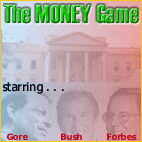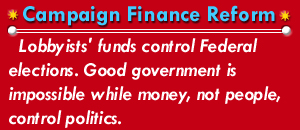Finance Fiasco: A Fundamental Fix
 Campaign finance reform is not an issue that moderate politicians, wary of upsetting Congress's fragile bipartisan balance, are going to address. The issue, at least on its surface, is a complex one: money's effect on and dominance of politics is entrenched in intricate loopholes in federal legislation. Its solution, however, is considerably more straight-forward. Money must get out of politics; a candidate's wealth, or the wealth of his constituents, should not be a factor in determining his political success. Money must be banned from political campaigns.
Campaign finance reform is not an issue that moderate politicians, wary of upsetting Congress's fragile bipartisan balance, are going to address. The issue, at least on its surface, is a complex one: money's effect on and dominance of politics is entrenched in intricate loopholes in federal legislation. Its solution, however, is considerably more straight-forward. Money must get out of politics; a candidate's wealth, or the wealth of his constituents, should not be a factor in determining his political success. Money must be banned from political campaigns.
 Citizens for True Democracy supports the abolition of all campaign contributions, including private ones. In short, neither hard nor soft money should be allowed. Campaigns should be financed publicly -- each candidate, whether Presidential, congressional, state, or local should have a campaign budget provided by the institution for which he is running. (Presidential and congressional elections should be financed by the Federal Government, while candidates for positions such as Governor or state legislator should be financed by the state, etc.) The Federal government owns the airwaves, including television, radio, and other media (including the Internet), hence regulatory agencies such as the Federal Communications Commission (FCC). The government should mandate that television and radio stations (at least) provide equal advertising time for competing parties (both regionally and nationally). As under current law, "gifts" to candidates and politicians should be prohibited.
Citizens for True Democracy supports the abolition of all campaign contributions, including private ones. In short, neither hard nor soft money should be allowed. Campaigns should be financed publicly -- each candidate, whether Presidential, congressional, state, or local should have a campaign budget provided by the institution for which he is running. (Presidential and congressional elections should be financed by the Federal Government, while candidates for positions such as Governor or state legislator should be financed by the state, etc.) The Federal government owns the airwaves, including television, radio, and other media (including the Internet), hence regulatory agencies such as the Federal Communications Commission (FCC). The government should mandate that television and radio stations (at least) provide equal advertising time for competing parties (both regionally and nationally). As under current law, "gifts" to candidates and politicians should be prohibited.
Such reform must occur through a consitutional amendment, for two reasons. First, as with the case of the electoral college, no mainstream politicians will support adequate reform. It is simply not in their best interests; in fact, it is in their worst. Campaign finance reform of this caliber could cripple the two major parties. Second, some will argue that this reform violates constitutional rights to free speech. While this is a vital issue, no one can argue that the specific speech being restricted has any merits -- only when considering the precedent that it sets is it the least bit frightening. But as long as it does not violate the First Amendment (and it doesn't, by definition, because it is itself a constitutional amendment), then the free speech argument becomes irrelevant. It will set no precedent for future restrictions and/or conditions on the First Amendment. Anyone who argues that money should have a voice, especially a significant one, in American politics should reconsider whether he believes in the concept of representative democracy.
 This proposal still does not adequately address the issue of soft money. It does not, and cannot, restrict people's choice to donate money to lobbyist and special interest groups. People could, for instance, still donate money to the Republican National Committee (RNC), which could then buy television advertising time supporting general principles of the Republican Party, without supporting a specific candidate.
This proposal still does not adequately address the issue of soft money. It does not, and cannot, restrict people's choice to donate money to lobbyist and special interest groups. People could, for instance, still donate money to the Republican National Committee (RNC), which could then buy television advertising time supporting general principles of the Republican Party, without supporting a specific candidate.
(Dole's 1996 presidential campaign, for example, had to turn to the RNC in the final months of the campaign, both because Dole spent heavily during the primary season defeating fellow Republicans and because the Clinton-Gore junta dominated the fundraising scene, particularly in foreign markets. Initially, the RNC ran ads generally supporting Republican candidates. But as Dole's defeat became inevitable as the campaign concluded, the ads shifted to "don't give Clinton a blank check," in an attempt to salvage the fledgling GOP congressional majorities.)
But one could draft the constitutional amendment in such a way that organizations could not buy public advertising (on TV, radio, public property, etc.) that supports a specific party; only advertisements that support or denounce specific ideas, principles, or policies should be legal. For example, a lobbyist organization could buy advertising which supported gun control, but could not specifically say that "All Democrats support gun control, so vote for Democrats in November." Again, this does conflict with principles set forth in the First Amendment, but, at the same time, it achieves a perfect harmony -- Americans would vote on issues, not the candidate's financial situation or party affiliation.
America's campaign finance problems have deep roots; as the first true capitalist economy, money frequently dominates political, social, and economic institutions. Neither the Constitution nor recent campaign finance legislation adequately consider money's impact on politics. So, we have a choice: either sit back and watch money and corruption overwhelm American democracy, or slightly restrict our right to give money to politicians (which would affect only a small number of Americans). By choosing the latter, we can rescue our floundering Republic. The choice is ours, but not for long.









